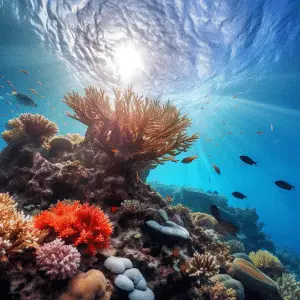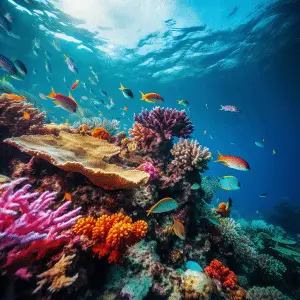The Importance of Reef-Safe Products
Reef-Safe Products: Keeping Corals Smiling!
Coral reef ecosystems are fragile and constantly threatened by human activities. To protect them, reef-safe products are essential. These are products that don’t contain any harmful chemicals that can damage coral reefs.
When we use non-reef-safe products, such as certain sunscreens and personal care items, the chemicals in them can wash off us and end up in the ocean. These chemicals can cause coral bleaching, disrupt the growth and reproduction of marine creatures, and even lead to the death of coral reefs. Choosing reef-safe alternatives helps minimize our impact.
Reef-safe products are not only beneficial to corals but also to our health. Popular sunscreens contain oxybenzone and octinoxate, two chemicals that are harmful to both humans and corals. These can disrupt hormones and may be risky to our well-being and marine life.
Fortunately, there are reef-safe options on the market. Look for labels that show the product is free of oxybenzone, octinoxate, parabens, phthalates, and other dangerous chemicals. Mineral-based sunscreens with zinc oxide or titanium dioxide are great alternatives.
Pro tip: When buying sunscreen or other personal care products, always read the ingredient list carefully. Avoid products with oxybenzone, octinoxate, parabens, phthalates, or any other chemicals known to be bad for marine life. Your skin and corals will thank you!
Understanding the Impact of Non-Reef-Safe Products

Non-reef-safe products have a major impact. To understand this, we must explore the facts. The table below shows their characteristics.
| Product | Chemicals Present | Effects on Coral |
|---|---|---|
| Sunscreen | Oxybenzone, Octinoxate | Bleaching, DNA Damage |
| Shampoo | Parabens, Sulfates | Disruption of Coral Resilience |
| Cosmetics | Phthalates, Siloxanes | Decreased Fertility |
| Cleaning Products | Triclosan | Altered Coral Microbiome |
These facts show the serious impact of non-reef-safe products on coral reefs. It’s important to look for alternative options for personal care and cleaning. Avoiding these products not only helps coral, but the whole marine ecosystem.
A study by the University of Hawaii found that oxybenzone, found in sunscreen, can cause coral bleaching at low concentrations. Reef-safe alternatives are essential for preserving ecosystems. Read labels to find them!
Criteria for Identifying Reef-Safe Products
Criteria for identifying reef-safe products exist. They include biodegradability, non-toxicity, and avoidance of ingredients that are harmful to coral reefs. If consumers follow these criteria when buying personal care and cleaning products, they can make environment-friendly choices.
Some companies may label products as “reef-safe”, yet not meet certain criteria. Thus, it is essential for consumers to research and verify product claims before buying.
Certifications from organizations such as the Environmental Working Group (EWG) or the Coral Reef Alliance (CORAL) ensure that a product has been thoroughly evaluated for its impact on marine ecosystems.
Studies show that chemicals like oxybenzone and octinoxate present in sunscreen can lead to coral bleaching and damage. To protect coral reefs, it is important to opt for reef-safe alternatives.
It is alarming to know that an estimated 6,000 tons of sunscreen enter coral reef areas annually worldwide. To save the environment and keep Nemo from becoming a fried fish stick, choosing reef-safe options is the way to go!
Benefits of Choosing Reef-Safe Options
Choosing reef-safe options reaps multiple rewards for both the environment and individuals. These include:
- Protecting Coral Reefs – chemicals in some personal care products and sunscreens harm reefs.
- Preserving Marine Biodiversity – by using reef-safe options, we help diverse ecosystems thrive.
- Promoting Sustainable Tourism – eco-minded tourists seek destinations that prioritize preservation.
- Supporting Local Economies – healthy reefs attract tourists, generating revenue for local communities.
- Ensuring Long-Term Resource Availability – protecting coral reefs ensures the sustainability of related industries.
In addition, reef-safe choices are a collective effort to counter the global decline of coral reefs. Our choices have an impact on fragile ecosystems, so making informed decisions will help preserve these invaluable natural wonders.
Emma, a scuba diver, discovered the true significance of reef-safe choices during a trip to a popular diving spot. By choosing a reef-safe sunscreen, she shielded her skin and aided conservation efforts in that area. The thriving underwater world she witnessed was proof of the positive influence of conscious consumer choices.
In a nutshell, opting for reef-safe brands is the only way to keep our marine mates from sinking!
How to Find and Support Reef-Safe Brands
Reef-safe brands are essential for safeguarding our precious ocean habitats. Here are tips to help you choose and support eco-friendly companies.
- Research: Before buying, take the time to look into the company’s policies and practices. Look for certifications such as “Reef-Safe” or “Coral-Friendly” to make sure their products won’t harm marine life.
- Ingredients: Check the ingredients list of beauty products and sunscreen. Steer clear of oxybenzone and octinoxate, as these have been linked to coral bleaching.
- Support Environmentally Responsible Brands: Buy from companies that prioritize sustainability and environmental stewardship. Doing so encourages others to do the same.
When searching for reef-safe brands, it’s important to see what else they are doing. Look for brands that donate a portion of profits to coral reef restoration projects.
To show further support, spread awareness through word-of-mouth recommendations or social media posts. Encourage people to choose to purchase products that align with an eco-friendly lifestyle.
By choosing reef-safe brands, consumers can make a big impact on our oceans’ health and ensure the survival of these remarkable ecosystems for future generations. Taking simple steps, such as ditching straws, can make a huge difference in protecting our reefs.
Promoting Reef-Safe Practices and Awareness
Securing coral reefs is significant in keeping a flourishing underwater ecosystem. To achieve this, we focus on promoting reef-safe practices and raising awareness about their preservation.
We can do this by:
- Encouraging responsible snorkeling and diving to reduce physical harm to coral reefs.
- Helping local communities who rely on coral reef ecosystems for their livelihoods.
- Explaining to tourists about the importance of not touching or standing on coral during their visits.
- Advocating the use of reef-safe sunscreen products with no harmful chemicals.
- Advocating for sustainable fishing practices, such as avoiding overfishing and using eco-friendly gears.
- Collaborating with governments and organizations to create marine protected areas around coral reefs.
By doing all this, we can reduce the negative effect on coral reefs and guarantee long-term sustainability for these invaluable habitats.
In addition, it’s essential to realize that the overall health of coral reefs depends not just on external factors but also on individual actions. Preventing activities like littering or discarding waste into the ocean can contribute significantly to guarding these delicate ecosystems.
Now, let’s tell an inspiring true story. In Mexico’s Riviera Maya, a group of locals formed an organization devoted to preserving nearby coral reefs. They secured funds through eco-tours and used the money to interact with local communities. They educated them about sustainable fishing techniques and motivated responsible tourism. This grassroots movement caused raised awareness and eventually led to better protection for the region’s flourishing coral reefs.
If you want to do your part for the reef, just keep in mind, Taking action is not just a Jason Statham movie, it’s a responsibility we all share.
Taking Action: Steps Individuals Can Take to Contribute

Want to help protect our reefs? Here’s a 5-step guide:
- Reduce your carbon footprint. Use energy-efficient light bulbs and choose renewable energy sources.
- Practice sustainable fishing. Select seafood responsibly and support local fisheries that use responsible practices.
- Limit chemical usage. Mind which products you use at home and on your body. Use reef-safe sunscreens and avoid fertilizers and pesticides.
- Educate yourself and others. Learn about the challenges facing coral reefs, and share your knowledge with others. Join conservation organizations and participate in community events.
- Volunteer or donate. Get involved in reef restoration projects, beach cleanups, or scientific research initiatives. Donate to environmental organizations if time is limited.
Every action counts! Even small changes can have a positive effect on reef ecosystems. Together, we can make a difference for future generations.
Conclusion: Making a Difference for Our Oceans and Coral Reefs
We must take action to protect our oceans and coral reefs. Making ‘reef-safe’ choices is key. Sunscreen with chemicals like oxybenzone and octinoxate can harm coral reefs. So, opt for reef-safe sunscreen. Avoid products with microbeads. These plastic particles can cause health issues for marine life. Support sustainable fishing practices. This helps preserve marine ecosystems. Lessen single-use plastic consumption, too. Reusable alternatives like metal straws or cloth bags are better for the environment.
